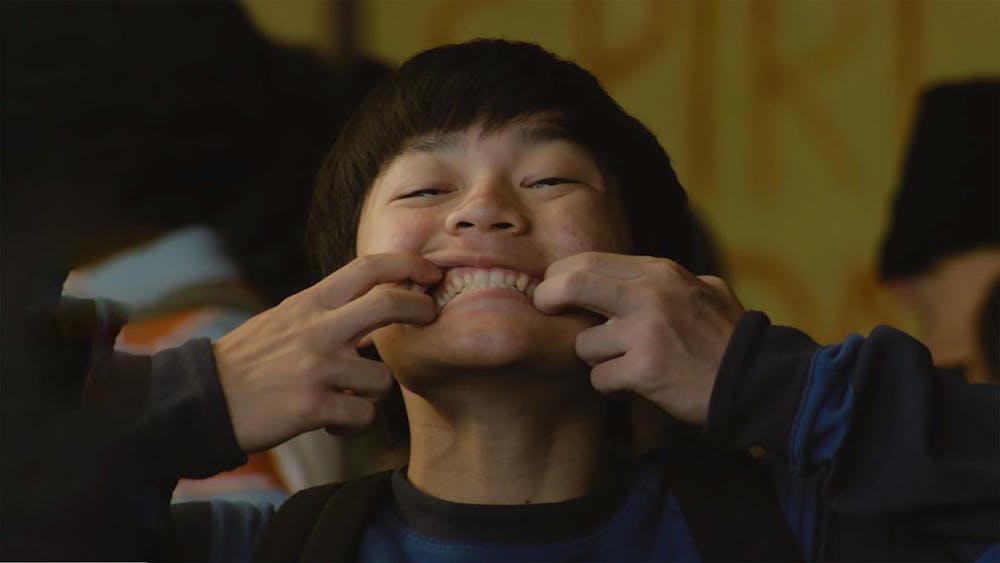The experience of growing up has been captured on film countless times — and for good reason. There is perhaps no other period of life that feels more sensitive, more eye-opening or more chaotic than the peak of adolescence. While director Sean Wang leans into the universality of being a teenager in his recent semi-autobiographical film “Dìdi,” he also takes the genre a step further by incorporating delicate cultural nuances and playful digital references into his take on “coming of age.”
“Dìdi” follows Chris Wang (Izaac Wang), a Taiwanese American 13-year-old in his last month of summer break before entering high school. It’s 2008 in Fremont, California, and the digital world has only just begun to take shape. Kids are surfing the web on their home-installed PCs, posting blurry selfie-status updates to Facebook and uploading shaky DIY prank videos to YouTube. Chris lives with his mother, Chungsing (Joan Chen), older sister Vivian (Shirley Chen), and grandmother Nai-Nai (Chang Li Hua), and often clashes with them due to cultural and generational divides. Chris’s father is mentioned to live separately in Taiwan, responsible for the family’s income, but his absence appears to be a difficult topic for Chungsing to address directly and for Chris to cope with.
While he is dìdi — Mandarin for “younger brother” — at home, outside with his rowdy group of friends, Chris is nicknamed “Wang Wang.” Unsure how to define himself, he struggles to both hold onto his childhood and mature as quickly as possible. One moment he is play-fighting with a group of neighborhood boys, the next he is stealing his sister’s band tees for a more sophisticated outfit. From trying to impress his crush Madi (Mahaela Park) to tagging along with an older group of boys as their makeshift skateboard filmer, Chris deals with changing social circles and underlying feelings of being misunderstood by others — feelings that bleed into his tense relationship with his mother. Throughout “Dìdi,” Chris’s life is defined by uncertainty. As the film follows him from home to crowded house parties to suburban skateparks, viewers — no matter their age or background — are made to reminisce on a time when they too felt like the world was moving too fast for them to catch up.
Like many other coming of age films, “Dìdi” is modeled off of its director’s real life experiences growing up, with Chris serving as a stand-in for Sean Wang’s younger self. While much of the film’s narrative is not extremely groundbreaking — many of its plot points are reminiscent of those in well-known indie teen films like “Mid90s” and “Eighth Grade” — Wang manages to create a portrait of growing up as an Asian American in the 2000s that feels authentic, both a personal love letter to his youth and a film that can resonate with many. Not only does “Dìdi” depict elements of Wang’s own past, the film also evinces Wang’s reflection on the cultural and familial dynamics that dominated his teenage years and are present in his artistic craft. Some of the most delicate and poignant moments of “Dìdi” come from scenes of Chris and his relatives, one such example is him having fun taking a video of his grandmother on his camcorder. Glimpses of Chungsing’s personal dreams beyond motherhood, as well as the arguments she has with her critical mother-in-law, subtly show Wang’s appreciation for his own mother — and perhaps also contain an apology.
Though Taiwanese American diasporic culture is a prominent part of the film, these aspects never feel overbearing or forced. “Dìdi” is able to appeal to a widespread audience, while also providing many Asian American viewers with a refreshing representation of their community on screen.
“Dìdi” ends almost as mundanely as it begins, in a place where neither Chris nor the audience knows where he really stands. The next four years of high school are impossible to predict, but despite the uncertainty that still lingers with Chris, we feel that things are going to turn out okay. Ironically, Wang’s debut coming of age film tells us that adolescence is anything but narratively linear, an up-and-down experience with no clear-cut beginning or end. Chris comes to understand his mother a little more, patch things halfway back together with his friends and start freshman year on a fresh note. However, we know that his life is still far from perfect; conflicts are sure to still come and go. Wang doesn’t try to offer a solution to teenage angst, but he shows us that a time will eventually come when one will be able to look back on all the emotions that come with growing up — and maybe even make a movie with all that they’ve learned.
Isabel Hahn is an Arts & Culture editor who concentrates in English and Behavioral Decision Sciences. In her free time, she enjoys watching movies, reading, and journaling.





